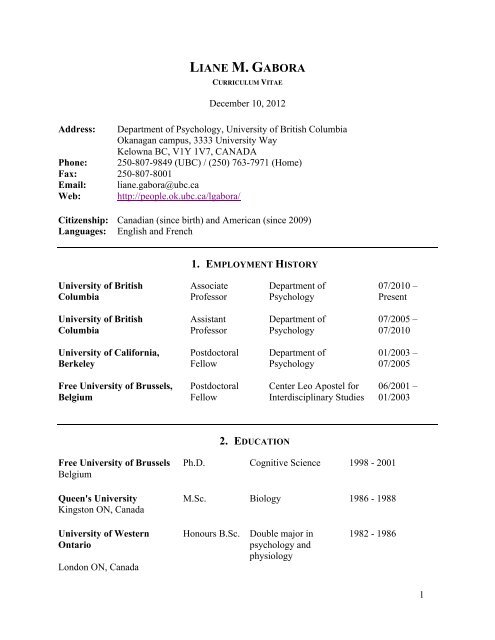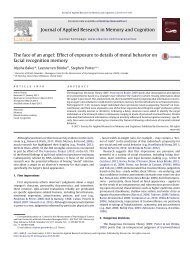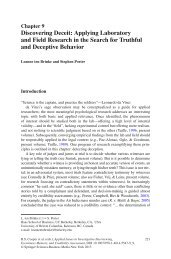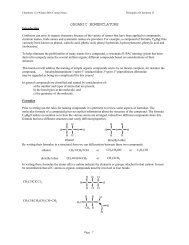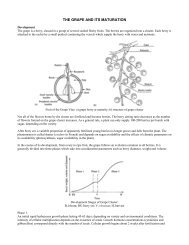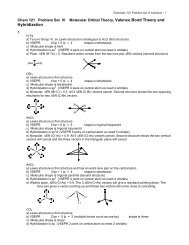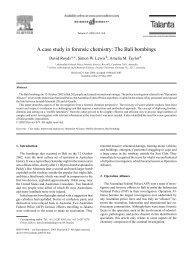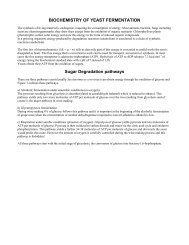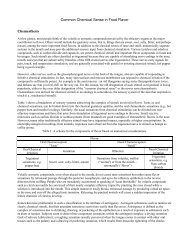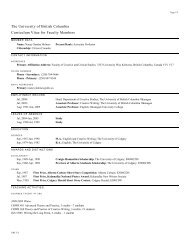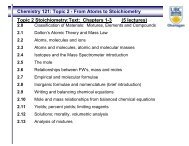LIANE M. GABORA - University of British Columbia
LIANE M. GABORA - University of British Columbia
LIANE M. GABORA - University of British Columbia
Create successful ePaper yourself
Turn your PDF publications into a flip-book with our unique Google optimized e-Paper software.
<strong>LIANE</strong> M. <strong>GABORA</strong><br />
CURRICULUM VITAE<br />
December 10, 2012<br />
Address: Department <strong>of</strong> Psychology, <strong>University</strong> <strong>of</strong> <strong>British</strong> <strong>Columbia</strong><br />
Okanagan campus, 3333 <strong>University</strong> Way<br />
Kelowna BC, V1Y 1V7, CANADA<br />
Phone: 250-807-9849 (UBC) / (250) 763-7971 (Home)<br />
Fax: 250-807-8001<br />
Email: liane.gabora@ubc.ca<br />
Web: http://people.ok.ubc.ca/lgabora/<br />
Citizenship: Canadian (since birth) and American (since 2009)<br />
Languages: English and French<br />
<strong>University</strong> <strong>of</strong> <strong>British</strong><br />
<strong>Columbia</strong><br />
<strong>University</strong> <strong>of</strong> <strong>British</strong><br />
<strong>Columbia</strong><br />
<strong>University</strong> <strong>of</strong> California,<br />
Berkeley<br />
Free <strong>University</strong> <strong>of</strong> Brussels,<br />
Belgium<br />
1. EMPLOYMENT HISTORY<br />
Associate<br />
Pr<strong>of</strong>essor<br />
Assistant<br />
Pr<strong>of</strong>essor<br />
Postdoctoral<br />
Fellow<br />
Postdoctoral<br />
Fellow<br />
2. EDUCATION<br />
Department <strong>of</strong><br />
Psychology<br />
Department <strong>of</strong><br />
Psychology<br />
Department <strong>of</strong><br />
Psychology<br />
Center Leo Apostel for<br />
Interdisciplinary Studies<br />
Free <strong>University</strong> <strong>of</strong> Brussels Ph.D. Cognitive Science 1998 - 2001<br />
Belgium<br />
Queen's <strong>University</strong> M.Sc. Biology 1986 - 1988<br />
Kingston ON, Canada<br />
<strong>University</strong> <strong>of</strong> Western<br />
Ontario<br />
London ON, Canada<br />
Honours B.Sc. Double major in<br />
psychology and<br />
physiology<br />
1982 - 1986<br />
07/2010 –<br />
Present<br />
07/2005 –<br />
07/2010<br />
01/2003 –<br />
07/2005<br />
06/2001 –<br />
01/2003<br />
1
RELATED STUDIES<br />
Santa Fe Institute Summer School for Complexity Studies Summer 1993<br />
Santa Fe, NM<br />
Université du Québec à<br />
Montréal<br />
Montreal, QU<br />
GENERAL AREAS<br />
Summer Institute for Cognitive Science<br />
3. RESEARCH INTERESTS<br />
• Creativity<br />
• Formal models <strong>of</strong> concepts and contextuality<br />
• Evolution <strong>of</strong> human cognition<br />
• Comparative study <strong>of</strong> evolutionary processes: biological and cultural<br />
• Light as a metaphor for enlightenment<br />
SPECIFIC QUESTIONS<br />
Summer 2003<br />
• How does the creative process work?<br />
• What kind <strong>of</strong> theory <strong>of</strong> concepts can model phenomena observed in studies <strong>of</strong> concepts<br />
and concept combination, e.g. the emergence <strong>of</strong> new properties? What are the practical<br />
implications and applications <strong>of</strong> such a theory?<br />
• Under what conditions can something evolve? In what sense does culture evolve?<br />
• How did the human mind become capable <strong>of</strong> evolving culture? How did it become<br />
creative?<br />
4. GRANTS<br />
Agency: Natural Sciences and Engineering Research Council <strong>of</strong> Canada (NSERC)<br />
Title: Development <strong>of</strong> a Cultural Algorithm and a Trans-disciplinary Framework for<br />
Evolutionary Processes<br />
Grant Period: 04/2012 – 04/2017<br />
Total Amount: $105,000 CAD (Annual increment: $21,000 / year)<br />
Peer Reviewed: Yes<br />
My Role: Principal Investigator<br />
Agency: Fund for Scientific Research (FWO) <strong>of</strong> Flanders, Belgium<br />
Title: Research on the construction <strong>of</strong> integrated worldviews<br />
Grant Period: 01/2011 – 01/2016<br />
2
Total Amount: 37500 Euros = 50,237 CAD (Annual increment: $10,000 CAD / year)<br />
Peer Reviewed: Yes<br />
My Role: Co-PI<br />
Agency: Concerted Research Program <strong>of</strong> the Fund for Scientific Research (FWO) <strong>of</strong> Flanders,<br />
Belgium and the Free <strong>University</strong> <strong>of</strong> Brussels<br />
Title: An Interdisciplinary Study <strong>of</strong> Creativity: Formal and Empirical Studies <strong>of</strong> Contextual<br />
Effects Across the Arts and Sciences<br />
Grant Period: 01/2009 – 01/2014<br />
Total Amount: 670,000 Euros = $1,076,052 CAD (Annual increment: $215,210 / year)<br />
Peer Reviewed: Yes<br />
My Role: Co-PI (with Diederik Aerts and co-PI Antoon van Braumbussche)<br />
Agency: Social Sciences and Humanities Research Council <strong>of</strong> Canada (SSHRC)<br />
Title: The Cultural Evolution <strong>of</strong> Integrated Worldviews<br />
Grant Period: 05/2008 – 05/2011<br />
Total Amount: $99,970, including $10,000 Research Teaching Stipend<br />
Peer Reviewed: Yes<br />
My Role: Principal Investigator<br />
Agency: UBC Okanagan Internal Research Grant<br />
Title: Does Appreciation <strong>of</strong> Culture as an Evolutionary Process lend Meaning to Life?<br />
Grant Period: 01/2007 – 01/2008<br />
Total Amount: $4,500<br />
My Role: Principal Investigator<br />
Agency: Fonds France Canada pour la Recherche<br />
Title: What Makes Human Cognition Unique? Language as an Auto-organizational Process<br />
Grant Period: 06/2006 – 12/2006<br />
Total Amount: $2,500<br />
Peer Reviewed: Yes<br />
My Role: Principal Investigator with co-PI Anne Reboul, CNRS, Lyons, France<br />
Agency: Foundation for the Future Research Grant<br />
Title: A Computational Model <strong>of</strong> the Evolution and Interaction <strong>of</strong> Ideologies<br />
Grant Period: 12/2005 – 12/2008<br />
Total Amount: $10,000 USD = $11,496 CDN<br />
Peer Reviewed: Yes<br />
My Role: Principal Investigator<br />
Agency: International Research Community Grant, funded by the Fund for Scientific Research,<br />
Flanders (Belgium).<br />
Title: The Construction <strong>of</strong> Integrating Worldviews<br />
Grant Period: 11/2005 – 11/2010<br />
Total Amount: 62,500.00 Euros = $86,982 CDN<br />
Peer Reviewed: Yes<br />
3
My Role: Co-PI with Diederik Aerts, Free <strong>University</strong> <strong>of</strong> Brussels, and others<br />
5. AWARDS<br />
2011 Berlyne Award for Outstanding Research<br />
American Psychological Association, Division 10 (Aesthetics, Creativity and the Arts)<br />
Awarded annually to a junior scholar (defined as 10 or fewer years after PhD)<br />
$500 USD + keynote address at annual convention<br />
Graduate Research Fellowship<br />
Center Leo Apostel for Interdisciplinary Studies, Free <strong>University</strong> <strong>of</strong> Brussels<br />
1998–2001<br />
Approx. $15,000/ year<br />
Graduate Research Fellowship<br />
Center for the Origin and Evolution <strong>of</strong> Life, UCLA<br />
1991–1993<br />
Approx. $14,000/ year<br />
Queens Graduate Award<br />
Department <strong>of</strong> Biology, Queens <strong>University</strong><br />
1986–1988<br />
Approx. $12,000/ year<br />
COURSES<br />
6. TEACHING AND STUDENT SUPERVISION<br />
• PSYO 121: Introduction to Personal Functioning<br />
• PSYO 317: Psychology <strong>of</strong> Creativity<br />
• PSYO 380A: Psychology <strong>of</strong> Humour<br />
• PSYO 380B: Evolution <strong>of</strong> Human Cognition<br />
• PSYO 480H: Advanced Special Topics – Creativity<br />
• IGS 509C: Creativity, Complexity, and Evolution (Graduate level)<br />
• IGS 501A: Theories and Methods in Research on Concepts (Graduate level)<br />
• IGS 620D: Psychology <strong>of</strong> Creativity (Graduate level)<br />
• IGS 620M: Advanced Special Topics – Creativity (Graduate level)<br />
ADVANCED STUDENT SUPERVISION<br />
• Supervisor <strong>of</strong> three (current) and one (past) UBC graduate students + co-supervisor <strong>of</strong> a<br />
student at Simon Fraser <strong>University</strong><br />
• Member <strong>of</strong> advisory committee <strong>of</strong> six (present) and one (past) graduate students<br />
• Supervised three Honours (PSYO 490) students<br />
4
• Supervised five Directed Studies (PSYO 390) students<br />
• Supervised one undergraduate summer research student (in 2006)<br />
• Supervised eight (past) and one (present) student research assistants<br />
(For details see my Teaching Portfolio: https://people.ok.ubc.ca/lgabora/teaching.htm )<br />
PEER-REVIEWED JOURNAL ARTICLES<br />
7. PUBLICATIONS<br />
Gabora, L., Leijnen, S. & Ghyczy, T. (in press). The relationship between creativity, imitation,<br />
and cultural diversity. International Journal <strong>of</strong> S<strong>of</strong>tware and Informatics.<br />
Gabora, L. Scott, E., & Kauffman, S. (2012). A quantum model <strong>of</strong> exaptation: Incorporating<br />
potentiality into biological theory. Progress in Biophysics & Molecular Biology.<br />
Gabora, L. (2012). An evolutionary framework for culture and creativity: Selectionism versus<br />
communal exchange. Physics <strong>of</strong> Life Reviews.<br />
Gabora, L., O’Connor, B., & Ranjan, A. (2012). The recognizability <strong>of</strong> individual creative<br />
styles within and across domains. Psychology <strong>of</strong> Aesthetics, Creativity, and the Arts,<br />
6(4), 351-360.<br />
Sternberg, R., Bonney, C. R., Gabora, L., & Merrifield, M. (2012). WICS: A Model for<br />
college and university admissions. Educational Psychologist, 47(1), 30-41.<br />
Sternberg, R., Bonney, C. R., & Gabora, L. (2012). Introduction to the special issue on<br />
college and university admissions. Educational Psychologist, 47(1), 1-4.<br />
Gabora, L. (2011). An analysis <strong>of</strong> the Blind Variation and Selective Retention (BVSR) theory <strong>of</strong><br />
creativity. Creativity Research Journal, 23(2), 155-165.<br />
Gabora, L. (2011). Five clarifications about cultural evolution. Journal <strong>of</strong> Cognition and Culture,<br />
11, 61-83.<br />
Aerts, D., Broekaert, J. & Gabora, L. (2011). A case for applying an abstracted quantum<br />
formalism to cognition. New Ideas in Psychology, 29(1), 136-146.<br />
Sternberg, R., Bonney, C. R., Gabora, L., Jarvin, L., Karelitz, T. M. & C<strong>of</strong>fin, L. (2010).<br />
Broadening the spectrum <strong>of</strong> undergraduate admissions. College & <strong>University</strong>, 86(1), 2-17.<br />
Gabora, L. (2010). Revenge <strong>of</strong> the ‘neurds’: Characterizing creative thought in terms <strong>of</strong> the<br />
structure and dynamics <strong>of</strong> memory. Creativity Research Journal, 22(1), 1-13.<br />
Gabora, L. & Leijnen, S. (2009). How creative should creators be to optimize the evolution <strong>of</strong><br />
ideas? A computational model. Electronic Proceedings in Theoretical Computer Science, 9,<br />
108-119.<br />
Gabora, L. & Aerts, D. (2009). A mathematical model <strong>of</strong> the emergence <strong>of</strong> an integrated<br />
worldview. Journal <strong>of</strong> Mathematical Psychology, 53, 434-451.<br />
Bruza, P., Busemeyer, J. & Gabora, L. (2009). Introduction to the special issue on quantum<br />
cognition. Journal <strong>of</strong> Mathematical Psychology, 53, 303-305.<br />
DiPaola, S. & Gabora, L. (2009). Incorporating characteristics <strong>of</strong> human creativity into an<br />
evolutionary art algorithm. Genetic Programming and Evolvable Machines, 10(2), 97–110.<br />
5
Gabora, L. & O'Connor, B. (2009). Applying complexity theory to a dynamical process model <strong>of</strong><br />
the development <strong>of</strong> pathological belief systems. Chaos and Complexity Letters, 4(3), 75-96.<br />
Gabora, L., Rosch, E., & Aerts, D. (2008). Toward an ecological theory <strong>of</strong> concepts. Ecological<br />
Psychology, 20(1), 84–116.<br />
Gabora, L. (2008). The cultural evolution <strong>of</strong> socially situated cognition. Cognitive Systems<br />
Research, 9(1-2), 104-113.<br />
Gabora, L. & Aerts, D. (2007). A cross-disciplinary framework for the description <strong>of</strong><br />
contextually mediated change. Electronic Journal <strong>of</strong> Theoretical Physics, 4(15), 1–22.<br />
Gabora, L. (2006). The fate <strong>of</strong> evolutionary archaeology: Survival or extinction? World<br />
Archaeology, 38(4), 690–696.<br />
Gabora, L. (2006). Self-other organization: Why early life did not evolve through natural<br />
selection. Journal <strong>of</strong> Theoretical Biology, 241(3), 443–250.<br />
Aerts, D., Czachor, M., Gabora L. & Polk, P. (2006). Soliton kinetic equations with non-<br />
Kolmogorovian structure: A new tool for biological modeling. Quantum Theory:<br />
Reconsideration <strong>of</strong> Foundations 3, American Institute <strong>of</strong> Physics Publications, 810, 19–33.<br />
Gabora, L. (2005). Creative thought as a non-Darwinian evolutionary process. Journal <strong>of</strong><br />
Creative Behavior, 39(4), 65–87.<br />
Gabora, L. & Aerts, D. (2005). Evolution as context-driven actualization <strong>of</strong> potential: Toward an<br />
interdisciplinary theory <strong>of</strong> change <strong>of</strong> state. Interdisciplinary Science Reviews, 30(1), 69–88.<br />
Aerts, D. & Gabora, L. (2005). A state-context-property model <strong>of</strong> concepts and their<br />
combinations I: The structure <strong>of</strong> the sets <strong>of</strong> contexts and properties. Kybernetes, 34(1&2),<br />
151–175.<br />
Aerts, D. & Gabora, L. (2005). A state-context-property model <strong>of</strong> concepts and their<br />
combinations II: A Hilbert space representation. Kybernetes, 34(1&2), 176–205.<br />
Gabora, L. (2004). Ideas are not replicators but minds are. Biology and Philosophy, 19(1),<br />
127–143.<br />
Aerts, D., Czachor, M., Gabora, L., Kuna, M., Posiewnik, A., Pykacz, J. & Syty, M.<br />
(2003). Quantum morphogenesis: A variation on Thom's catastrophe theory, Physical<br />
Review E, 67, 051926. Reprinted in Virtual Journal <strong>of</strong> Biological Physics, June issue.<br />
Gabora, L. & Aerts, D. (2002). Contextualizing concepts using a mathematical<br />
generalization <strong>of</strong> the quantum formalism. Journal <strong>of</strong> Experimental and Theoretical<br />
Artificial Intelligence, 14(4), 327–358.<br />
Gabora, L. (2002). Amplifying phenomenal information: Toward a fundamental theory <strong>of</strong><br />
consciousness. Journal <strong>of</strong> Consciousness Studies, 9(8), 3–29.<br />
Aerts, D., D'Hondt, E., & Gabora, L. (2000). Why the disjunction in quantum logic is not<br />
classical. Foundations <strong>of</strong> Physics, 30(9), 1473–1480.<br />
Aerts, D., Aerts, S., Broekaert, J., & Gabora, L. (2000). The violation <strong>of</strong> Bell inequalities<br />
in the macroworld. Foundations <strong>of</strong> Physics, 30(9), 1387–1414.<br />
Gabora, L. (2000). Conceptual closure. How memories are woven into an interconnected<br />
worldview. Annals <strong>of</strong> the New York Academy <strong>of</strong> Sciences, 901, 42–53.<br />
Gabora, L. (2000). From a double aspect theory <strong>of</strong> information to human consciousness.<br />
Consciousness and Cognition, 9(2), S78.<br />
6
Gabora, L. (1999). Microtubules, anesthetics, and quantum consciousness: An interview<br />
with Stuart Hamer<strong>of</strong>f. Foundations <strong>of</strong> Science, 4(2), 205–223.<br />
Aerts, D., Broekaert, J. & Gabora, L. (1999). Formal and informal representations <strong>of</strong><br />
science. Foundations <strong>of</strong> Science, 4(1), 1–3.<br />
Gabora, L. (1999). Weaving, bending, patching, mending the fabric <strong>of</strong> reality: A cognitive<br />
science perspective on worldview inconsistency. Foundations <strong>of</strong> Science, 3(2), 395–<br />
428.<br />
Gabora, L. (1999). More on memes. Semiotic Review <strong>of</strong> Books, 10(2), 2–3.<br />
Gabora, L. (1998). Autocatalytic closure in a cognitive system: A tentative scenario for the<br />
origin <strong>of</strong> culture. Psycoloquy, 9(67).<br />
http://www.cogsci.ecs.soton.ac.uk/cgi/psyc/newpsy?9.67<br />
Gabora, L. (1997). The origin and evolution <strong>of</strong> culture and creativity. Journal <strong>of</strong> Memetics:<br />
Evolutionary Models <strong>of</strong> Information Transmission, 1(1).<br />
www.jom-emit.cfpm.org/1997/vol1/gabora_l.html<br />
Gabora, L. (1997). Taking memes seriously. Semiotic Review <strong>of</strong> Books, 8(2), May issue.<br />
Gabora, L. (1996). A day in the life <strong>of</strong> a meme. Philosophica, 57, 901–938. Invited paper<br />
for special issue on concepts, representations, and dynamical systems.<br />
H<strong>of</strong>stadter, D. & Gabora, L. (1989). Synopsis <strong>of</strong> a workshop on humor and cognition.<br />
Humor, 2(4), 417–440.<br />
PEER-REVIEWED CONTRIBUTIONS TO CONFERENCE PROCEEDINGS<br />
Veloz, T., Tempkin, I., & Gabora, L. (2012). A conceptual network-based approach to inferring<br />
cultural phylogenies. Proceedings <strong>of</strong> the Annual Meeting <strong>of</strong> the Cognitive Science Society<br />
(pp. 2487-2492). August 1-4, 2011, Sapporo Japan.<br />
Gabora, L., & Firouzi, H. (2012). Society functions best with an intermediate level <strong>of</strong> creativity.<br />
Proceedings <strong>of</strong> the Annual Meeting <strong>of</strong> the Cognitive Science Society (pp. 1578-1583).<br />
August 1-4, 2011, Sapporo Japan.<br />
Riley, S. & Gabora, L. (2012). Evidence that threatening situations enhance creativity.<br />
Proceedings <strong>of</strong> the Annual Meeting <strong>of</strong> the Cognitive Science Society (pp. 2234-2239).<br />
August 1-4, 2011, Sapporo Japan.<br />
Gabora, L. & Kitto, K. (2012). How a quantum approach to memory incorporates contextuality<br />
and potentiality. Proceedings <strong>of</strong> the Annual Meeting <strong>of</strong> the Cognitive Science Society (pp.<br />
2674). August 1-4, Sapporo Japan.<br />
Aerts, D., Broekaert, J. Gabora, L., & Veloz, T. (2012). The guppy effect as interference.<br />
Proceedings <strong>of</strong> the Sixth International Symposium on Quantum Interaction. June 27-29,<br />
Paris.<br />
Kitto, K., Bruza, P., & Gabora, L. (2012). A quantum information retrieval approach to memory.<br />
Proceedings <strong>of</strong> the International Joint Conference on Neural Networks (pp. 932-939). June<br />
10-15, Brisbane, Australia, IEEE Computational Intelligence Society.<br />
Gabora, L., & DiPaola, S. (2012). How Did Humans Become So Creative? Proceedings <strong>of</strong> the<br />
International Conference on Computational Creativity. May 31 - June 1, 2012, Dublin,<br />
Ireland.<br />
7
Gabora, L. & Saberi, M. (2011). How did human creativity arise? An agent-based model <strong>of</strong> the<br />
origin <strong>of</strong> cumulative open-ended cultural evolution. Proceedings <strong>of</strong> the ACM Conference on<br />
Cognition & Creativity (pp. 299-306). November 3-6, 2011. Atlanta, GA.<br />
Aerts, D., Gabora, L., Sozzo, S. & T. Veloz, T. (2011). Quantum structure in cognition:<br />
Fundamentals and applications. Proceedings <strong>of</strong> The Fifth International Conference on<br />
Quantum, Nano and Micro Technologies (ICQNM 2011), French Riviera, France, August<br />
21-27, 2011.<br />
Gabora, L. & Saab, A. (2011). Creative interference and states <strong>of</strong> potentiality in analogy problem<br />
solving. Proceedings <strong>of</strong> the Annual Meeting <strong>of</strong> the Cognitive Science Society (pp. 3506-<br />
3511). July 20-23, 2011, Boston MA.<br />
Gabora, L., Leijnen, S., Veloz, T. & Lipo, C. (2011). A non-phylogenetic conceptual network<br />
architecture for organizing classes <strong>of</strong> material artifacts into cultural lineages. Proceedings <strong>of</strong><br />
the Annual Meeting <strong>of</strong> the Cognitive Science Society (pp. 2923-2928). July 20-23, 2011,<br />
Boston MA.<br />
Veloz, T. & Gabora, L. (2011). Toward a formal model <strong>of</strong> the shifting relationship between<br />
concepts and contexts in associative thought. Proceedings <strong>of</strong> the Annual Meeting <strong>of</strong> the<br />
Cognitive Science Society (pp. 827). July 20-23, 2011, Boston MA.<br />
Veloz, T., Gabora, L., Eyjolfson, M. & Aerts, D. (2011). A model <strong>of</strong> the shifting relationship<br />
between concepts and contexts in different modes <strong>of</strong> thought. Proceedings <strong>of</strong> the Fifth<br />
International Symposium on Quantum Interaction. June 27-29, 2011, Aberdeen, UK.<br />
Mithani, M., Veloz, T., & Gabora, L. (2010). An analysis <strong>of</strong> context dependency in the<br />
recognition and manifestation <strong>of</strong> entrepreneurial opportunity. In: P. Bruza, W. Lawless, K.<br />
van Rijsbergen, D. S<strong>of</strong>ge, & D. Widdows (Eds.) Proceedings <strong>of</strong> the Association for the<br />
Advancement <strong>of</strong> Artificial Intelligence (AAAI) Fall Symposium on Quantum Informatics for<br />
Cognitive, Social, and Semantic Processes. November 11-13, 2010, Washington DC.<br />
Ranjan, A. Gabora, L. & O'Connor (2010). The recognizability <strong>of</strong> individual style. Proceedings<br />
<strong>of</strong> an International Conference on Cognition, Experience, and Creativity. October 29-31,<br />
Ahmedabad, India.<br />
Leijnen, S. & Gabora, L. (2010). An agent-based simulation <strong>of</strong> the effectiveness <strong>of</strong> creative<br />
leadership. Proceedings <strong>of</strong> the Annual Meeting <strong>of</strong> the Cognitive Science Society (pp. 955-<br />
960). August 11-14, 2010, Portland, Oregon.<br />
Gabora, L. (2010). Recognizability <strong>of</strong> creative style within and across domains: Preliminary<br />
studies. Proceedings <strong>of</strong> the Annual Meeting <strong>of</strong> the Cognitive Science Society (pp. 2350-<br />
2355). August 11-14, 2010, Portland, Oregon.<br />
O’Connor, B. & Gabora, L. (2010). Studies <strong>of</strong> the effects on creativity <strong>of</strong> having very different<br />
parents. Proceedings <strong>of</strong> the Annual Meeting <strong>of</strong> the Cognitive Science Society (pp. 2432).<br />
August 11-14, 2010, Portland, Oregon.<br />
Leijnen, S. & Gabora, L. (2009). The artist l<strong>of</strong>t effect in the clustering <strong>of</strong> ‘creative types’: A<br />
computer simulation. In N. Bryans-Kins (Ed.) Proceedings <strong>of</strong> the 7th Creativity and<br />
Cognition Conference, Hosted by the <strong>University</strong> <strong>of</strong> California, Berkeley and Berkeley Art<br />
Museum, Oct 27-30, 2009, Berkeley, CA. New York NY: ACM Press.<br />
Gabora, L. & Leijnen, S. (2009). The trade<strong>of</strong>f between degree <strong>of</strong> creativity and number <strong>of</strong><br />
creators in a computational model <strong>of</strong> society. In B. Cooper & V. Danos (Eds.) Proceedings<br />
8
<strong>of</strong> Developments in Computational Models: Computational Models from Nature (DCM 09),<br />
Rhodes, Greece, July 11, 2009.<br />
Aerts, D., Aerts, S. & Gabora, L. (2009). Experimental evidence for quantum structure in<br />
cognition. Proceedings <strong>of</strong> the Third International Conference on Quantum Interaction,<br />
Saarbrucken, Germany, March 2009, pp. 59-70.<br />
Gabora, L. (2008). Modeling cultural dynamics. Proceedings <strong>of</strong> the Association for the<br />
Advancement <strong>of</strong> Artificial Intelligence (AAAI) Fall Symposium 1: Adaptive Agents in a<br />
Cultural Context, Arlington VA, November 7 – 9, 2008, AAAI Press, pp. 18-25.<br />
Gabora, L. (2008). EVOC: A computer model <strong>of</strong> the evolution <strong>of</strong> culture. Proceedings <strong>of</strong> the 30 th<br />
Annual Meeting <strong>of</strong> the Cognitive Science Society, Washington DC, July 23 – 26, 2008,<br />
Sheridan.<br />
DiPaola, S. & Gabora, L. (2007). Incorporating characteristics <strong>of</strong> human creativity into an<br />
evolutionary art algorithm. In (D. Thierens, Ed.), Proceedings <strong>of</strong> the Genetic and<br />
Evolutionary Computing Conference (GECCO), July 7-11, 2007, <strong>University</strong> College<br />
London, England, pp. 2442–2449.<br />
Gabora, L. (2007). Cultural evolution entails (creativity entails (concept combination entails<br />
quantum structure)). Proceedings <strong>of</strong> the Association for the Advancement <strong>of</strong> Artificial<br />
Intelligence (AAAI) Spring Symposium 8: Quantum Interaction, March 26-28, Stanford<br />
<strong>University</strong>, pp. 106–113.<br />
Aerts, D., Bundervoet, S., Czachor, M., & Gabora, L. (2005). On the foundations <strong>of</strong> the theory <strong>of</strong><br />
evolution. In (G. E. Lasker, Ed.) Proceedings <strong>of</strong> the 17th International Conference on<br />
Systems Research, Informatics and Cybernetics, August 3, 2005, Baden-Baden, Germany.<br />
Aerts, D., Czachor, M., Gabora, L., & Polk, P. (2005). Application <strong>of</strong> quantum formalisms to<br />
biological rhythms. In (G. Adenier, Ed.) Proceedings <strong>of</strong> the Third International Conference<br />
on Quantum Theory: Reconsiderations <strong>of</strong> Foundations, June 7–12, Växjö, Sweden.<br />
Gabora, L. & Aerts, D. (2005). Distilling the essence <strong>of</strong> an evolutionary process, and<br />
implications for a formal description <strong>of</strong> culture. In (W. Kistler, Ed.) Proceedings <strong>of</strong> Center<br />
for Human Evolution Workshop #5: Cultural Evolution, May 2000, Foundation for the<br />
Future, Seattle.<br />
Gabora, L. (2004). Two transitions in the evolution <strong>of</strong> human consciousness. In (M. Zussman,<br />
Ed.) Proceedings <strong>of</strong> the 24 th Annual Conf Society for the Anthropology <strong>of</strong> Consciousness,<br />
Berkeley, CA, 24–28 March.<br />
Gabora, L. (2003). Contextual focus: A cognitive explanation for the cultural transition <strong>of</strong> the<br />
Middle/Upper Paleolithic. In (R. Alterman & D. Hirsch, Eds.) Proceedings <strong>of</strong> the 25th<br />
Annual Meeting <strong>of</strong> the Cognitive Science Society (432-437), Boston MA, 31 July - 2 August.<br />
Lawrence Erlbaum.<br />
Gabora, L. (2002). Cognitive mechanisms underlying the creative process. In (T. Hewett and T.<br />
Kavanagh, Eds.) Proceedings <strong>of</strong> the Fourth International Conference on Creativity and<br />
Cognition, 13–16 October, Loughborough <strong>University</strong> UK, 126–133. [cited 51 times]<br />
Gabora, L. & Aerts, D. (2002). Contextualizing concepts. In (C. Faucher, Ed.) Proceedings <strong>of</strong><br />
the 15th International FLAIRS Conference (Special Track ‘Categorization and Concept<br />
Representation: Models and Implications’), Pensacola FL, 14-17 May 2002, American<br />
Association for Artificial Intelligence, 148–152.<br />
9
Gabora, L. (2000). Linkage disequilibrium in human creativity. In (R. Ascott, Ed.) Proceedings<br />
<strong>of</strong> the Third International CAiiA-STAR Conference: Consciousness Reframed, 17-20<br />
August, Newport Wales.<br />
Gabora, L. (2000). From a double aspect theory <strong>of</strong> information to human consciousness. In (A.<br />
Cleeremans, Ed.) Proceedings <strong>of</strong> ASSC4, International Conference on the Unity <strong>of</strong><br />
Consciousness: Binding, Unity, and Dissociation, 29 June - 2 July, Free <strong>University</strong> <strong>of</strong><br />
Brussels (ULB), Belgium.<br />
Gabora, L. (1999). Conceptual closure: Weaving memories into an interconnected worldview. In<br />
(G. Van de Vijver & J. Chandler, Eds.) Proceedings <strong>of</strong> Closure: an International<br />
Conference on Emergent Organizations and their Dynamics, held by the Research<br />
Community on Evolution and Complexity and the Washington Evolutionary Systems<br />
Society, May 3-5, <strong>University</strong> <strong>of</strong> Gent, Belgium.<br />
Gabora, L. (1996). Culture, evolution, and computation. In (T. Furuhashi, Ed.) Proceedings <strong>of</strong><br />
the Second Online Workshop on Evolutionary Computation. Society <strong>of</strong> Fuzzy Theory and<br />
Systems.<br />
Gabora, L. (1992). Should I stay or should I go: coordinating biological needs with continuouslyupdated<br />
assessments <strong>of</strong> the environment (a computer model). In (S. Wilson, J. A. Mayer &<br />
H. Roitblat, Eds.) Proceedings <strong>of</strong> Second International Conference on the Simulation <strong>of</strong><br />
Adaptive Behavior, Honolulu, MIT Press, 156–162.<br />
Gabora, L. & Colgan, P. (1990). A model <strong>of</strong> the mechanisms underlying exploratory behavior. In<br />
(S. Wilson & J. A. Mayer, Eds.) Proceedings <strong>of</strong> the First International Conference on the<br />
Simulation <strong>of</strong> Adaptive Behavior, Paris, MIT Press, 475–484.<br />
BOOK CHAPTERS<br />
Gabora, L. (invited). Modeling stigmergy in human cultural evolution. In (T. Lewis & L. Marsh,<br />
eds.) Human stigmergy.<br />
Gabora, L. (in press). The creative process at work in musical composition. (Hans-Joachim<br />
Braun, Ed.) Creativity: Technology and the arts. Peter Lang: Frankfurt / New York. Invited<br />
December 9, 2010.<br />
Gabora, L. & Ranjan, A. (in press). How creative ideas emerge in a sparse, distributed, contentaddressable<br />
memory. In A. Bristol, O. Vartanian, & J. Kaufman, Eds) The neuroscience <strong>of</strong><br />
creativity. New York: Oxford <strong>University</strong> Press. Invited September 21, 2009.<br />
Gabora, L., & Kitto, K. (2012). Concept combination and the origins <strong>of</strong> complex cognition. In<br />
(L. Swan, Ed.) Origins <strong>of</strong> mind (pp. 361-382). Berlin: Springer.<br />
Ranjan, A. & Gabora, L. (2012). Creative ways <strong>of</strong> nurturing the potential to learn. In (H. Synder,<br />
M. Gregerson & J. Kaufman, Eds.) Teaching creatively (pp. 119-132). New York: Springer.<br />
Gabora, L. & Merrifield, M. (2012). Dynamical disequilibrium, transformation, and the<br />
evolution and development <strong>of</strong> sustainable worldviews. In (F. Orsucci & N. Sala, Eds.)<br />
Complexity Science, Living Systems, and Reflexing Interfaces: New Models and Perspectives<br />
(pp. 69-77). Hershey, PA: IGI Global.<br />
Gabora, L. (2011). Can an understanding <strong>of</strong> how culture evolves awaken a sense <strong>of</strong> meaning in<br />
life? In (D. Aerts, B. D'Hooghe, & N. Note, Eds.) Worldviews, Science, and Us (pp. 37-54).<br />
Singapore: World Scientific.<br />
10
O’Connor, B. & Gabora, L. (2011). A general dynamical process model <strong>of</strong> the development <strong>of</strong><br />
pathological belief systems. In F. Orsucci (Ed.) Mind force (pp. 75-96). New York, NY:<br />
Nova Science.<br />
Gabora, L. & Russon, A. (2011). The evolution <strong>of</strong> human intelligence. In (R. Sternberg & S.<br />
Kaufman, Eds.) Cambridge handbook <strong>of</strong> intelligence (pp. 328-350). Cambridge <strong>University</strong><br />
Press.<br />
Gabora, L. & Kaufman, S. (2010). Evolutionary perspectives on creativity. In (J. Kaufman & R.<br />
Sternberg, Eds.) Cambridge handbook <strong>of</strong> creativity (pp. 279-300). Cambridge UK:<br />
Cambridge <strong>University</strong> Press.<br />
Gabora, L. & Holmes, N. (2010). Dangling from a tassel on the fabric <strong>of</strong> socially constructed<br />
reality: Reflections on the creative writing process. In (A. Cropley, D. Cropley, J. Kaufman,<br />
& M. Runco, Eds.) The dark side <strong>of</strong> creativity (pp. 277-296). Cambridge UK: Cambridge<br />
<strong>University</strong> Press.<br />
Aerts, D., Aerts, S. & Gabora, L. (2009). Experimental evidence for quantum structure in<br />
cognition. In: P. Bruza, W. Lawless, K. van Rijsbergen, & D. S<strong>of</strong>ge (Eds.) Lecture Notes in<br />
Computer Science: Quantum interaction (pp. 59-79). Berlin: Springer.<br />
Gabora, L. & Aerts, D. (2008). A cross-disciplinary framework for the description <strong>of</strong><br />
contextually mediated change. In (I. Licata & A. Sakaji, Eds.) Physics <strong>of</strong> emergence and<br />
organization, (pp. 109-134). Singapore: World Scientific.<br />
Gabora, L. (2008). Mind. In (R. A. Bentley, H. D. G. Maschner, & C. Chippindale, Eds.)<br />
Handbook <strong>of</strong> theories and methods in archaeology, Altamira Press, Walnut Creek CA, (pp.<br />
283-296). http://www.vub.ac.be/CLEA/liane/papers/htma-mind.htm<br />
Aerts, D., Bundervoet, S., Czachor, M., D'Hooghe B., Gabora L. & Polk P. (2006). On the<br />
foundations <strong>of</strong> the theory <strong>of</strong> evolution. Systems theory in philosophy and religion, Vols I &<br />
II. Ed. M. Locker. Windsor, Canada: IIAS.<br />
Aerts, D., Broekaert, J. & Gabora, L. (2002). Intrinsic contextuality as the crux <strong>of</strong> consciousness.<br />
In (K. Yasue, M. Jibu & T. Della Senta) No matter, never mind, John Benjamins Publishing<br />
Company, Amsterdam (Vol. 33 <strong>of</strong> the series Advances in Consciousness Research ISSN<br />
1381–589X). Amsterdam: John Benjamins Publishing Company.<br />
Gabora, L. (2002). The beer can theory <strong>of</strong> creativity. In (P. Bentley & D. Corne, Eds.) Creative<br />
evolutionary systems (pp. 147–161), San Francisco CA: Morgan Kauffman.<br />
Gabora, L. (2000). Conceptual closure: Weaving memories into an interconnected worldview. In<br />
(G. Van de Vijver & J. Chandler, Eds.) Closure: Emergent organizations and their<br />
dynamics. Annals <strong>of</strong> the New York Academy <strong>of</strong> Sciences, 901, 42–53.<br />
Gabora, L. (2000). Toward a theory <strong>of</strong> creative inklings. In (R. Ascott, Ed.) Art, technology, and<br />
consciousness (pp. 159–164). Bristol UK: Intellect Press.<br />
Gabora, L. (1995). Meme and variations: A computer model <strong>of</strong> cultural evolution. In (L. Nadel<br />
& D. Stein, Eds.) 1993 Lectures in complex systems (pp. 471–486), Boston MA: Addison-<br />
Wesley.<br />
NON-PEER-REVIEWED ARTICLES<br />
Gabora, L. (2012). Fake Flooring and Fake People: Does growing up around fake stuff<br />
encourage fakeness? In ‘Mindbloggling’, online version <strong>of</strong> Psychology Today.<br />
11
http://www.psychologytoday.com/blog/mindbloggling/201207/fake-flooring-and-fake-people<br />
Gabora, L. (2012). Does It Make Any Sense to Apply Quantum Mechanics to How People<br />
Think? In ‘Mindbloggling’, online version <strong>of</strong> Psychology Today.<br />
http://www.psychologytoday.com/blog/mindbloggling/201203/does-it-make-any-senseapply-quantum-mechanics-how-people-think<br />
Gabora, L. (2011). Is Loyalty Destroying Us? In ‘Mindbloggling’, online version <strong>of</strong> Psychology<br />
Today. http://www.psychologytoday.com/blog/mindbloggling/201112/is-loyalty-destroyingus<br />
Gabora, L. (2011). How Creative Ideas Take Shape. In ‘Mindbloggling’, online version <strong>of</strong><br />
Psychology Today. http://www.psychologytoday.com/blog/mindbloggling/201109/howcreative-ideas-take-shape<br />
Gabora, L. (2011). Are you the First Member <strong>of</strong> a New Species? In ‘Mindbloggling’, online<br />
version <strong>of</strong> Psychology Today.<br />
http://www.psychologytoday.com/blog/mindbloggling/201105/are-you-the-first-membernew-species<br />
Gabora, L. (2011). How a Generation Was Misled About Natural Selection. In ‘Mindbloggling’,<br />
online version <strong>of</strong> Psychology Today.<br />
http://www.psychologytoday.com/blog/mindbloggling/201105/how-generation-was-misledabout-natural-selection<br />
Gabora, L. (2011). Are effective leaders creative? In ‘Mindbloggling’, online version <strong>of</strong><br />
Psychology Today. http://www.psychologytoday.com/blog/mindbloggling/201102/areeffective-leaders-creative<br />
Gabora, L. (2010). Should everyone be creative? In ‘Mindbloggling’, online version <strong>of</strong><br />
Psychology Today.<br />
http://www.psychologytoday.com/blog/mindbloggling/201011/should-everyone-be-creative<br />
Gabora, L. (2010). Holistic Creativity. In ‘Mindbloggling’, online version <strong>of</strong> Psychology Today.<br />
http://www.psychologytoday.com/blog/mindbloggling/201008/holistic-creativity<br />
Gabora, L. (2010). The sadness <strong>of</strong> potted plants: Darwinian versus non-Darwinian conceptions<br />
<strong>of</strong> humanity. In ‘Mindbloggling’, online version <strong>of</strong> Psychology Today.<br />
http://www.psychologytoday.com/blog/mindbloggling/201005/the-sadness-potted-plantsdarwinian-versus-non-darwinian-conceptions-human<br />
Gabora, L. (2010). The Power <strong>of</strong> 'Then': The Uniquely Human Capacity to Imagine Beyond the<br />
Present. In ‘Mindbloggling’, online version <strong>of</strong> Psychology Today.<br />
http://www.psychologytoday.com/blog/mindbloggling/201003/the-power-then-the-uniquelyhuman-capacity-imagine-beyond-the-present<br />
Gabora, L. (2010). Un-family-ar Values. In ‘Mindbloggling’, online version <strong>of</strong> Psychology<br />
Today. http://www.psychologytoday.com/blog/mindbloggling/201001/un-family-ar-values-1<br />
ENCYCLOPEDIA ENTRIES<br />
Gabora, L. (in press). Research on creativity. In (E. G. Carayannis, Ed.) Encyclopedia <strong>of</strong><br />
Creativity, Invention, Innovation, and Entrepreneurship. New York: Springer.<br />
Gabora, L. (in press). Psychology <strong>of</strong> creativity. In (E. G. Carayannis, Ed.) Encyclopedia <strong>of</strong><br />
Creativity, Invention, Innovation, and Entrepreneurship. New York: Springer.<br />
12
Gabora, L. (in press). Cultural evolution. In (Kaldis, B, Ed.) Encyclopedia <strong>of</strong> Philosophy and the<br />
Social Sciences. Thousand Oaks, CA: Sage.<br />
Gabora, L. (2012). Convergent evolution. In (Maloy, S. & Hughes, K., Eds.) Brenner’s Online<br />
Encyclopedia <strong>of</strong> Genetics, 2nd edition. Amsterdam: Elsevier.<br />
Gabora, L. (2000). Memetics. In (P. Bouissac, Ed.) The Encyclopedia <strong>of</strong> Semiotics. (pp. 405–<br />
408). Oxford: Oxford <strong>University</strong> Press.<br />
COMMENTARIES<br />
Aerts, D., Gabora, L., Suzzo, S., & Broekaert, J. (in press). Quantum structure and human<br />
thought. Commentary on E. Pothos & J. Busemeyer, ‘Can quantum probability provide a<br />
new direction for cognitive modeling?’ Behavioral and Brain Sciences.<br />
Gabora, L. & Lipo, C. (2012). Review <strong>of</strong> E. Cochrane & A. Gardner (eds.) Evolutionary and<br />
Interpretive Archaeologies: A Dialogue. KIVA: The Journal <strong>of</strong> Southwestern Anthropology<br />
and History, 87(1), 103–108.<br />
Gabora, L. & Ranjan, A. (2011). Nuancing the neuron: A review <strong>of</strong> ‘The Memory Process:<br />
Neuroscientific and Humanistic Perspectives’. PsycCritiques: Contemporary Psychology<br />
APA Review <strong>of</strong> Books, 56(39).<br />
Gabora, L. (2010). Why Blind-Variation-Selective-Attention is inappropriate as an explanatory<br />
framework for creativity. Physics <strong>of</strong> Life Reviews, 7(2), 190-194.<br />
Gabora, L. (2007). Why the creative process is not Darwinian. Commentary on D. K. Simonton<br />
‘The creative process in Picasso’s Guernica sketches: Monotonic improvements versus<br />
nonmonotonic variants.’ Creativity Research Journal, 19(4), 361-365.<br />
Gabora, L. (2007). Epigenetic and cultural evolution are not Darwinian. Commentary on E.<br />
Jablonka & M. J. Lamb, ‘Evolution in Four Dimensions’. Behavioral and Brain Sciences,<br />
30(4), p. 371.<br />
Gabora, L. (2004). GAS doesn't ‘turn the engine’ when states are sequential or contextdependent.<br />
Behavioral and Brain Sciences, 27(6), 901–902. Commentary on D. Hull, R.<br />
Langman & S. Glenn ‘A general account <strong>of</strong> selection: Biology, immunology, and behavior’.<br />
Behavioral and Brain Sciences 24(3), 511–528.<br />
Gabora, L. (1999). Grounded in perception yet transformed into amodal symbols. Commentary<br />
on ‘Perceptual symbol systems’ by L. W. Barsalou. Behavioral and Brain Sciences, 22(4),<br />
577-660.<br />
Gabora, L. (1994). The birth <strong>of</strong> a creative idea. Commentary on ‘The Creative Mind: Myths and<br />
Mechanisms’ by M. Boden. Behavioral and Brain Sciences, 17(3), 543.<br />
Gabora, L. (1993). Cultural transitions occur when mind parasites learn new tricks. Commentary<br />
on ‘Origins <strong>of</strong> the Modern Mind’ by M. Donald. Behavioral and Brain Sciences, 16(4), 761–<br />
762.<br />
Gabora, L. (1993). Cultural learning as the transition mechanism in an evolutionary process.<br />
Commentary on ‘Cultural Learning’ by Tomasello et al. Behavioral and Brain Sciences,<br />
16(3), 519.<br />
BOOK REVIEWS<br />
13
Gabora, L. & Lipo, C. (2012). Review <strong>of</strong> E. Cochrane & A. Gardner (eds.) Evolutionary and<br />
Interpretive Archaeologies: A Dialogue. KIVA: The Journal <strong>of</strong> Southwestern Anthropology<br />
and History, 87(1), 103–108.<br />
Gabora, L. & Ranjan, A. (2011). Nuancing the neuron: A review <strong>of</strong> ‘The Memory Process:<br />
Neuroscientific and Humanistic Perspectives’. PsycCritiques: Contemporary Psychology<br />
APA Review <strong>of</strong> Books, 56(39). http://www.deepdyve.com/lp/psyccritiques-reg/nuancing-theneuron-wrYiFOOMh0<br />
Gabora, L. (2009). Review <strong>of</strong> ‘Epigenetic principles <strong>of</strong> evolution’, First Edition, by Nelson R.<br />
Cabej. Quarterly Review <strong>of</strong> Biology, 84(2), 193.<br />
Provencal, A. & Gabora, L. (2007). A compelling overview <strong>of</strong> art therapy techniques and<br />
outcomes: Review <strong>of</strong> ‘Art Therapy has Many Faces’. Psychology <strong>of</strong> Aesthetics, Creativity,<br />
and the Arts, 1(4), 255-256.<br />
Gabora, L. (2007). Perspectives on artistic creativity. Review <strong>of</strong> M. Turner (Ed.) ‘The artful<br />
mind: Cognitive science and the riddle <strong>of</strong> human creativity’. Philosophical Psychology,<br />
20(5), 669-674.<br />
Gabora, L. (2000). Nonlinear science and the psyche: A review <strong>of</strong> F. Orsucci, Ed. (2000). ‘The<br />
Complex Matters <strong>of</strong> the Mind’. Foundations <strong>of</strong> Science , 5(3), 391–393.<br />
Gabora, L. (1999). A review <strong>of</strong> ‘The Meme Machine’ by S. Blackmore. Journal <strong>of</strong> Artificial<br />
Societies and Social Simulation 2(2) (e-journal).<br />
http://jasss.soc.surrey.ac.uk/2/2/review2.html<br />
Gabora, L. (1999). To imitate is human: A review <strong>of</strong> ‘The Meme Machine’ by S. Blackmore.<br />
Journal <strong>of</strong> Consciousness Studies, 6(5), 77–81.<br />
SUBMITTED<br />
Aerts, D., Gabora, L., & Sozzo, S. How concepts combine: A quantum model. Invited for special<br />
issue <strong>of</strong> Trends in Cognitive Science.<br />
IN PREPARATION<br />
Gabora, L. Dawn <strong>of</strong> the Creative Mind: The Origin and Evolution <strong>of</strong> Human Innovation. (Book<br />
manuscript).<br />
INVITED LECTURES<br />
8. PRESENTATIONS<br />
(For conference talks accepted on the basis <strong>of</strong> an abstract see below.)<br />
• Media and Graphics Interdisciplinary Centre (MAGIC), Forest Sciences Centre Building,<br />
<strong>University</strong> <strong>of</strong> <strong>British</strong> <strong>Columbia</strong>, Vancouver, BC. November 16, 2012. Title <strong>of</strong> talk:<br />
Modeling the evolution <strong>of</strong> ideas and worldviews.<br />
14
• UBC Vision Lab (host: Jim Enns), Department <strong>of</strong> Psychology, Kenny Building,<br />
<strong>University</strong> <strong>of</strong> <strong>British</strong> <strong>Columbia</strong>, Vancouver, BC. September 22, 2012. Title <strong>of</strong> talk:<br />
Sight, and Perspective.<br />
• Acoustic Communication and Soundscape Design, a workshop organized by Hans-<br />
Joachim Braun and Barry Truax. September 14, 2012, Green College, UBC, Vancouver,<br />
BC. Title <strong>of</strong> talk: Can a Soundscape Become a Painting?<br />
• Panpsychism on the Reef, a workshop on the combination problem for panpsychism. July<br />
20-25, 2012, Lady Elliot Island, Australia. Organized by D. Chalmers, Hosted by the<br />
Department <strong>of</strong> Philosophy, Australian National <strong>University</strong>, Canberra AU. Title <strong>of</strong> talk:<br />
Amplifying Phenomenal Information.<br />
• 2012 LERN Lunchtime Lecture Series, <strong>University</strong> College London, London, UK, May 29,<br />
2012. Title <strong>of</strong> talk: The Honing Theory <strong>of</strong> Creativity.<br />
• 2012 Department <strong>of</strong> Psychology Lecture Series, <strong>University</strong> <strong>of</strong> Surrey, Guildford, UK,<br />
May 28, 2012. Title <strong>of</strong> talk: The Honing Theory <strong>of</strong> Creativity.<br />
• Invited lecture at the international workshop Conceptual Spaces at Work.<br />
http://www.fil.lu.se/conferences/conference.asp?id=46&lang=se May 24-26, 2012, Lund,<br />
Sweden. Host: Frank Zenker. Title <strong>of</strong> talk: Modeling the Transformation <strong>of</strong> Conceptual<br />
Spaces through Insight.<br />
• Invited speaker for <strong>University</strong> <strong>of</strong> <strong>British</strong> <strong>Columbia</strong>, Okanagan campus, Psychology<br />
Department Brown Bag Seminar Series, April 25, 2012, Kelowna BC. Title <strong>of</strong> talk: The<br />
Honing Theory <strong>of</strong> Creativity.<br />
• 2011-2012 Cognitive Science Program Colloquium Series, <strong>University</strong> <strong>of</strong> Arizona, Tucson<br />
AZ, November 18, 2011. Title <strong>of</strong> talk: The Honing Theory <strong>of</strong> Creativity.<br />
• Defining Cognitive Science Colloquium Series, Simon Fraser <strong>University</strong>, Vancouver BC,<br />
November 16, 2011. Title <strong>of</strong> talk: Honing theory: A Complex Systems Inspired View <strong>of</strong><br />
Creativity.<br />
• Dagstuhl Seminar Series, Leibniz Center for Informatics. Schloss Dagstuhl, Germany,<br />
October 28 – September 02, 2011. Title <strong>of</strong> talk: Problem Finding and Problem Solving.<br />
• 'Mind & Matter' Distinguished Lecture Series, Institute <strong>of</strong> Cognitive Science, <strong>University</strong><br />
<strong>of</strong> Louisiana, Lafayette, LA, February 16, 2011. Title <strong>of</strong> talk: Competing Theories <strong>of</strong><br />
Creativity: Selecting Amongst Well-defined Alternatives versus Actualizing the Potential<br />
<strong>of</strong> Half-baked Possibilities.<br />
• Mind Force: ConverseActions on the Embodied Mind. <strong>University</strong> <strong>of</strong> Siena, Italy, October<br />
8, 2010. Title <strong>of</strong> talk: Creativity and Dynamical Disequilibrium.<br />
• BrusselsBodySpeech: Times <strong>of</strong> Entanglement, an event dedicated to exploring the<br />
interface between art and science commissioned for the World Expo 2010, Shanghai,<br />
China, September 22, 2010. Title <strong>of</strong> talk: When Concepts get Entangled.<br />
• BrusselsBodySpeech: Times <strong>of</strong> Entanglement, an event dedicated to exploring the<br />
interface between art and science commissioned for the World Expo 2010, Shanghai,<br />
China, September 21, 2010. Title <strong>of</strong> talk: What Goes on in your Mind during a Flash <strong>of</strong><br />
Insight?<br />
15
• American Psychological Association convention, symposium on ‘Teaching Psychology<br />
Creatively’, San Diego California, August 12, 2010. Title <strong>of</strong> talk: ‘‘Teaching Psychology<br />
Using Animation, Humor, Examples, and Instructive Games’.<br />
• Meeting <strong>of</strong> the Society for Philosophy and Psychology, Portland Oregon, June 10-12,<br />
2010. Title <strong>of</strong> talk: How Does the Creative Process Work?<br />
• Department <strong>of</strong> Psychology, <strong>University</strong> <strong>of</strong> California, San Bernardino, CA. February 18,<br />
2010. Title <strong>of</strong> talk: In What Sense does Culture Evolve?<br />
• Lipo Lab, Department <strong>of</strong> Archaeology, <strong>University</strong> <strong>of</strong> California, Long Beach, CA.<br />
February 17, 2010. Title <strong>of</strong> talk: In What Sense does Culture Evolve?<br />
• Departments <strong>of</strong> Business Management and Psychology, Yale <strong>University</strong>, Newhaven, CT.<br />
November 10, 2009. Title <strong>of</strong> talk: How Does the Creative Process Work?<br />
• Harvard <strong>University</strong> Divinity School, Stuart Kauffman Interdisciplinary Discussion<br />
Group, March 5, 2009. Title <strong>of</strong> talk: How does the Creative Process Work?<br />
• Department <strong>of</strong> Cognitive Science Seminar Series, Carleton <strong>University</strong>, Ottawa Ontario,<br />
January 22, 2009. Title <strong>of</strong> talk: How does the Creative Process Work?<br />
• Department <strong>of</strong> Psychology, Tufts <strong>University</strong>, Medford, MA, October 17, 2008. Title <strong>of</strong><br />
talk: How does the Creative Process Work?<br />
• Complexity Perspectives on the Origins <strong>of</strong> Language, Culture, and Art: An International<br />
Workshop, <strong>University</strong> <strong>of</strong> Leiden, The Netherlands, June 19, 2008. Title <strong>of</strong> Keynote: The<br />
Origin and Evolution <strong>of</strong> Creative Culture.<br />
• BC Educational Technology Users Group (ETUG) Annual Spring Workshop, Emily Carr<br />
Institute <strong>of</strong> Art and Design, Vancouver, BC, May 29, 2008. Title <strong>of</strong> Keynote: Creativity:<br />
Awakening the Spectrum <strong>of</strong> Possibilities.<br />
• Psychology Departmental Seminar Series, <strong>University</strong> <strong>of</strong> <strong>British</strong> <strong>Columbia</strong>, Vancouver,<br />
BC, Feb 15, 2008. Title <strong>of</strong> talk: How does the Creative Process Work?<br />
• Emily Carr Institute <strong>of</strong> Art and Design Seminar Series, Vancouver, BC, February 14,<br />
2008. Title <strong>of</strong> talk: How does the Creative Process Work?<br />
• School <strong>of</strong> Interactive Arts & Technology Seminar Series, Faculty <strong>of</strong> Applied Sciences,<br />
Simon Fraser <strong>University</strong> (Surrey campus), Vancouver, BC, February 13, 2008. Title <strong>of</strong><br />
talk: How does the Creative Process Work?<br />
• Culture in Evolutionary Perspective, an international workshop, Coach House, Green<br />
College, UBC Vancouver, April 14-15, 2007. Title <strong>of</strong> talk: A non-Darwinian Model <strong>of</strong><br />
Cultural Evolution.<br />
• School <strong>of</strong> Interactive Arts & Technology, Faculty <strong>of</strong> Applied Sciences, Simon Fraser<br />
<strong>University</strong> (Surrey campus), Surrey BC. February 21, 2007. Title <strong>of</strong> talk: Human<br />
Invention: From handaxe to palm pilot.<br />
• UBC Okanagan Biology Seminar Series, Kelowna, BC. Nov. 29, 2006. Title <strong>of</strong> talk: Selfother<br />
organization: Why early life did not evolve through natural selection.<br />
• Max Planck Institute for Research on Collective Goods, July 10, 2006, Bonn, Germany.<br />
Title <strong>of</strong> talk: How creative processes drive world change.<br />
• Meeting <strong>of</strong> the European Society for Creativity (Crea Universite), Universite Rene<br />
Descartes, July 4–6, 2006, Paris, France. Title <strong>of</strong> talk: Dawn <strong>of</strong> the creative mind.<br />
• Workshop on Memetics, April 4-5, 2006, Defense Advanced Research Projects Agency<br />
16
(DARPA), Arlington VA. Did not attend in person but my powerpoint presentation was<br />
delivered by conference host.<br />
• Cognitive Science Winter Lecture Series, January 18, 2006, Case Western Reserve<br />
<strong>University</strong>. Title <strong>of</strong> Talk: Dawn <strong>of</strong> the creative mind.<br />
• Workshop on Music and Cognition, December 20, 2005, Institute des Sciences<br />
Cognitives, CNRS, Lyons, France. Title <strong>of</strong> Talk: Toward a cognitive theory <strong>of</strong> musical<br />
inspiration.<br />
• Cognition, Brain, and Behavior Seminar, February 3, 2005, Department <strong>of</strong> Psychology,<br />
<strong>University</strong> <strong>of</strong> California, Berkeley. Title <strong>of</strong> talk: Evolution <strong>of</strong> the capacity for creative<br />
thought.<br />
• Archaeology Seminar Series, February 8, 2005, Department <strong>of</strong> Archaeology, <strong>University</strong><br />
<strong>of</strong> California, Berkeley. Title <strong>of</strong> talk: Evolution <strong>of</strong> the capacity for creative thought.<br />
• Multiple Versions <strong>of</strong> the World: A Conference Celebrating the Centennial and Continued<br />
Influence <strong>of</strong> Gregory Bateson. November 20, 2004, <strong>University</strong> <strong>of</strong> California, Berkeley.<br />
Title <strong>of</strong> poster: Toward an ecological model <strong>of</strong> concepts and the evolution <strong>of</strong> ideas.<br />
• I.D.E.A. Frontier: Industry, Design, Education and the Arts on the Frontier <strong>of</strong><br />
Innovation, June 4-6, 2004, St. Clair College, Windsor Canada. Title <strong>of</strong> keynote: The<br />
beer can theory <strong>of</strong> creativity. Title <strong>of</strong> workshop: The interplay <strong>of</strong> freedom and constraint<br />
in the creative process.<br />
• USCKI Incognito: A Symposium on Concepts, Consciousness and Cognition, May 12,<br />
2004, Utrecht, Netherlands. Title <strong>of</strong> talk: Two transitions in the evolution <strong>of</strong> human<br />
cognition.<br />
• Meeting <strong>of</strong> the Zazi Forum, June 4-5, 2003, San Diego, CA. Talk title: Cognitive<br />
mechanisms underlying creativity and implications for innovation.<br />
• Intelligent Sound and Music Systems Weekly Seminar, February 6, 2003, Centre for<br />
Computational Creativity, <strong>University</strong> College London. Title <strong>of</strong> talk: Cognitive<br />
mechanisms underlying creativity.<br />
• Weekly Seminar on Cognition and Archaeology, February 6, 2003, Institute <strong>of</strong><br />
Archaeology, City College London. Title <strong>of</strong> talk: A tentative explanation for the<br />
Paleolithic revolution.<br />
• Paradigms <strong>of</strong> Change, May 23-25, 2002, Center for Development Research, <strong>University</strong><br />
<strong>of</strong> Bonn, Germany. Title <strong>of</strong> talk: Do ideas and cultures really evolve?<br />
• Workshop on Categorization, Recognition, and Perception, April 18-19, 2002,<br />
Department <strong>of</strong> Psychology, <strong>University</strong> College London. Title <strong>of</strong> talk: Contextualizing<br />
concepts.<br />
• Workshop on Cultural Evolution, May 17-18, 2000, Foundation for the Future, Seattle.<br />
Title <strong>of</strong> talk: Introducing contextuality into a theory <strong>of</strong> cultural evolution.<br />
• Subtle Technologies Conference, May 13-14, 2000, <strong>University</strong> <strong>of</strong> Toronto. Title <strong>of</strong> talk:<br />
Creativity as a mirror that reflects and reinforces the self.<br />
• Konrad Lorenz Institute for Evolution and Cognition Research, February 8, 2000,<br />
Vienna. Title <strong>of</strong> talk: The origin and evolution <strong>of</strong> culture.<br />
• Konrad Lorenz Institute for Evolution and Cognition Research, February 3, 2000,<br />
Vienna. Title <strong>of</strong> talk: From double aspect theory to human cognition.<br />
17
• Center for Theoretical Study, Charles <strong>University</strong>, February 10, 2000, Prague. Title <strong>of</strong><br />
talk: The origin and evolution <strong>of</strong> culture.<br />
• Foundations Lecture Series, July 1998, Center Leo Apostel for Interdisciplinary Studies,<br />
Brussels Free <strong>University</strong>. Title <strong>of</strong> talk: The origin and evolution <strong>of</strong> culture and creativity.<br />
CONFERENCES AND WORKSHOP PRESENTATIONS<br />
(Does not include invited lectures; when there are other contributors their names are given and<br />
the presenter’s name is underlined.)<br />
Talks<br />
• International Conference on Computational Creativity. May 31 - June 1, 2012, Dublin,<br />
Ireland. Title <strong>of</strong> talk: How Did Humans Become So Creative? Liane Gabora and Steven<br />
DiPaola.<br />
• Conceptual Structure Discourse and Language Conference 2012. May 17-20, 2012,<br />
Vancouver, BC. Title <strong>of</strong> talk: Modeling the Transformation <strong>of</strong> Conceptual Spaces using a<br />
Quantum Model <strong>of</strong> Concept Combination and the Notion <strong>of</strong> Self-organized Criticality.<br />
• ACM Conference on Cognition & Creativity. Nov 3-6, 2011. Atlanta, GA. Title <strong>of</strong> talk:<br />
How did Human Creativity Arise? An Agent-based Model <strong>of</strong> the Origin <strong>of</strong> Cumulative<br />
Open-ended Cultural Evolution. Liane Gabora and Maryam Saberi.<br />
• The Fifth International Conference on Quantum, Nano and Micro Technologies, August<br />
21-27, 2011, Nice, France. Title <strong>of</strong> talk: Quantum Structure in Cognition: Fundamentals<br />
and Applications. Diederik Aerts, Sandro Sozzo, Liane Gabora and Tomas Veloz.<br />
• American Psychological Association convention in Washington DC, August 4-7, 2011.<br />
Title <strong>of</strong> talk: Do Threatening Situations Evoke Creativity? Sean Riley and Liane Gabora.<br />
• American Psychological Association convention in Washington DC, August 4-7, 2011.<br />
Title <strong>of</strong> talk: Authenticity in Performance: Is it Detectable? Madeleine Henderson and<br />
Liane Gabora. (Originally accepted as a poster but changed to a talk.)<br />
• American Psychological Association convention in Washington DC, August 4-7, 2011.<br />
Title <strong>of</strong> talk: The Recognizability <strong>of</strong> Creative Style Within and Across the Domains <strong>of</strong><br />
Art, Writing, and Music. Apara Ranjan, Liane Gabora, Brian O’Connor, and Manuela<br />
Ungureanu.<br />
• American Psychological Association convention in Washington DC, August 4-7, 2011.<br />
Title <strong>of</strong> talk: Should Everyone Be Creative? A computer simulation. Liane Gabora and<br />
Maryam Saberi.<br />
• Second Meeting <strong>of</strong> the Society for Complex Systems in Cognitive Science, July 19, 2011,<br />
Boston MA. Title <strong>of</strong> talk: Insight and Self-organized Criticality. Liane Gabora and Tomas<br />
Veloz.<br />
• 44th annual meeting <strong>of</strong> the Society for Mathematical Psychology, Tufts <strong>University</strong>, July<br />
15, 2011, Medford MA. Title <strong>of</strong> talk: A thought-mode dependent identification <strong>of</strong> context<br />
relevance and exemplar representativeness for concepts. Tomas Veloz and Liane Gabora.<br />
• Fifth International Symposium on Quantum Interaction. June 27, 2011, Aberdeen, UK.<br />
Title <strong>of</strong> talk: A model <strong>of</strong> the shifting relationship between concepts and contexts in<br />
18
different modes <strong>of</strong> thought. Tomas Veloz, Liane Gabora, Mark Eyjolfson and Diederik<br />
Aerts.<br />
• Fall Symposium on Quantum Informatics for Cognitive, Social, and Semantic Processes,<br />
Association for the Advancement <strong>of</strong> Artificial Intelligence (AAAI). Washington DC,<br />
November 11-13, 2010. Title <strong>of</strong> talk: An analysis <strong>of</strong> context dependency in the<br />
recognition and manifestation <strong>of</strong> entrepreneurial opportunity. Murad Mithani, Tomas<br />
Veloz. and Liane Gabora.<br />
• International Conference on Cognition, Experience, and Creativity, Indian Institute <strong>of</strong><br />
Technology Gandhinagar. Ahmedabad, India, October 29-31, 2010. Title <strong>of</strong> talk: The<br />
recognizability <strong>of</strong> individual style in musical interpretation. Liane Gabora, Apara Ranjan<br />
and Brian O'Connor.<br />
• Annual Meeting <strong>of</strong> the Cognitive Science Society, Portland, Oregon, August 13, 2010.<br />
Title <strong>of</strong> talk: An Agent-based Simulation <strong>of</strong> the Effectiveness <strong>of</strong> Creative Leadership.<br />
Liane Gabora and Stefan Leijnen.<br />
• Annual Convention <strong>of</strong> the American Psychological Association. Session 1048:<br />
Symposium on Humor, August 6, 2009, Toronto, ON, Canada. Title <strong>of</strong> talk: The<br />
Anatomy <strong>of</strong> a Joke.<br />
• Annual Convention <strong>of</strong> the American Psychological Association. August 6, 2009, Toronto,<br />
ON, Canada. Title <strong>of</strong> talk: Computer Generated Art Inspired by Mechanisms <strong>of</strong> Human<br />
Creativity Creativity. Liane Gabora and Steve DiPaola.<br />
• Developments in Computational Models: Computational Models from Nature (DCM 09),<br />
a workshop in association with the 36th International Colloquium on Automata,<br />
Languages, and Programming (ICALP). http://www.pps.jussieu.fr/~danos/dcm09/<br />
European Association for Theoretical Computer Science, July 11, 2009, Rhodes, Greece.<br />
Title <strong>of</strong> talk: The Trade<strong>of</strong>f between Degree <strong>of</strong> Creativity and Number <strong>of</strong> Creators in a<br />
Computational Model <strong>of</strong> Society. Liane Gabora and Stefan Leijnen.<br />
• Third International Conference on Quantum Interaction. March 2009, German Research<br />
Center for Artificial Intelligence, Saarbruken, Germany. Title <strong>of</strong> talk: Experimental<br />
Evidence for Quantum Structure in Cognition.<br />
• Association for the Advancement <strong>of</strong> Artificial Intelligence (AAAI) Fall Symposium 1:<br />
Adaptive Agents in a Cultural Context, November 7-9, 2008, Arlington, VA. Title <strong>of</strong> talk:<br />
Modeling Cultural Dynamics.<br />
• Genetic and Evolutionary Computing Conference (GECCO), July 7-11, 2007, <strong>University</strong><br />
College London, England. Title <strong>of</strong> talk: Incorporating Characteristics <strong>of</strong> Human<br />
Creativity into an Evolutionary Art Algorithm.<br />
• Association for the Advancement <strong>of</strong> Artificial Intelligence (AAAI) Spring Symposium 8:<br />
Quantum Interaction, March 26-28, Stanford <strong>University</strong>. Title <strong>of</strong> talk: Cultural Evolution<br />
Entails (Creativity Entails (Concept Combination Entails Quantum Structure)).<br />
• Meeting <strong>of</strong> the European Society for Creativity (Crea Universite), Universite Rene<br />
Descartes, July 4–6, 2006, Paris, France. Title <strong>of</strong> talk: Dawn <strong>of</strong> the Creative Mind.<br />
• Seventeenth International Conference on Systems Research, Informatics and<br />
Cybernetics: Second Symposium on Systems Theory in Religion and Philosophy, August<br />
3, 2005, Baden-Baden, Germany. Title <strong>of</strong> talk: On the Foundations <strong>of</strong> the Theory <strong>of</strong><br />
Evolution.<br />
19
• Third International Conference on Quantum Theory: Reconsiderations <strong>of</strong> Foundations,<br />
June 7-12, 2005, Växjö, Sweden. Title <strong>of</strong> talk: Application <strong>of</strong> Quantum Formalisms to<br />
Biological Rhythms.<br />
• Congress on Evolution, Epistomology, Language and Culture. May 26 - 28, 2004, Free<br />
<strong>University</strong> <strong>of</strong> Brussels, Belgium. Title <strong>of</strong> talk: Evolution <strong>of</strong> Worldviews through Contextdriven<br />
Actualization <strong>of</strong> Potential.<br />
• Society for the Anthropology <strong>of</strong> Consciousness Annual Meeting, March 24 - 27, 2004,<br />
<strong>University</strong> <strong>of</strong> California, Berkeley. Title <strong>of</strong> talk: Two Transitions in the Evolution <strong>of</strong><br />
Human Consciousness.<br />
• Fourth International Conference on Creativity and Cognition, 13-16 October 2002,<br />
Loughborough <strong>University</strong> UK. Title <strong>of</strong> talk: Cognitive Mechanisms Underlying the<br />
Creative Process.<br />
• Fifteenth International FLAIRS Conference (Special Track ‘Categorization and Concept<br />
Representation: Models and Implications’), May 14-17, 2002, Pensacola FL. Sponsored<br />
by the American Association for Artificial Intelligence. Title <strong>of</strong> talk: Contextualizing<br />
Concepts. Liane Gabora and Diederik Aerts.<br />
• Workshop on Cultural Evolution, May 17-18, 2000, Foundation for the Future, Seattle.<br />
Title <strong>of</strong> talk: Introducing Contextuality into a Theory <strong>of</strong> Cultural Evolution.<br />
• Third International CAiiA-STAR Conference, Consciousness Reframed, August 17-20,<br />
2000, Newport Wales. Title <strong>of</strong> talk: Linkage Disequilibrium in Human Creativity.<br />
• Toward a Science <strong>of</strong> Consciousness, April 10-14, 2000, <strong>University</strong> <strong>of</strong> Arizona, Tucson,<br />
AZ. Title <strong>of</strong> talk: Contextuality in conscious experience.<br />
• Meeting <strong>of</strong> the Society for Chaos in the Life Sciences, July 1999, <strong>University</strong> <strong>of</strong> California,<br />
Berkeley. Title <strong>of</strong> talk: Stability and Boundaries, Physical and Psychological.<br />
• Closure: an International Conference on Emergent Organizations and their Dynamics,<br />
held by the Research Community on Evolution and Complexity and the Washington<br />
Evolutionary Systems Society, May 3-5, 1999, <strong>University</strong> <strong>of</strong> Gent, Belgium. Title <strong>of</strong> talk:<br />
Conceptual closure: Weaving Memories into an Interconnected Worldview.<br />
• Tenth Meeting <strong>of</strong> the Human Behavior and Evolution Society, June 1995, <strong>University</strong> <strong>of</strong><br />
California, Santa Barbara CA. Title <strong>of</strong> talk: A Computer Model <strong>of</strong> Cultural Evolution.<br />
• Second International Conference on the Simulation <strong>of</strong> Adaptive Behavior, 1992,<br />
Honolulu HI. Title <strong>of</strong> talk: Should I Stay or Should I Go: Coordinating Biological Needs<br />
with Continuously-updated Assessments <strong>of</strong> the Environment (A Computer Model).<br />
• First International Conference on the Simulation <strong>of</strong> Adaptive Behavior, 1990, Paris. Title<br />
<strong>of</strong> talk: A Model <strong>of</strong> the Mechanisms Underlying Exploratory Behavior. Liane Gabora and<br />
Patrick Colgan.<br />
POSTERS<br />
• Annual Meeting <strong>of</strong> the Cognitive Science Society. August 1-4, 2012, Sapporo Japan. Title:<br />
A conceptual network-based approach to inferring cultural phylogenies. Tomas Veloz,<br />
Liane Gabora and Ilya Tempkin.<br />
20
• Annual Meeting <strong>of</strong> the Cognitive Science Society. August 1-4, 2012, Sapporo Japan. Title:<br />
Society functions best with an intermediate level <strong>of</strong> creativity. Liane Gabora and Hadi<br />
Firouzi.<br />
• Annual Meeting <strong>of</strong> the Cognitive Science Society. August 1-4, 2012, Sapporo Japan. Title:<br />
Evidence that threatening situations enhance creativity. Sean Riley and Liane Gabora.<br />
• International Joint Conference on Neural Networks. June 10-15, 2012, Brisbane,<br />
Australia. Title: A quantum information retrieval approach to memory. Kirsty Kitto, Peter<br />
Bruza, and Liane Gabora.<br />
• Annual Convention <strong>of</strong> the American Psychological Association in Washington DC,<br />
August 4-7, 2011. Title: Potentiality States in Analogy Problem Solving. Adam Saab and<br />
Liane Gabora (Originally accepted as a talk but changed to a poster.)<br />
• Annual Meeting <strong>of</strong> the Cognitive Science Society. July 23, 2011, Boston MA. Title: A<br />
non-phylogenetic conceptual network architecture for organizing classes <strong>of</strong> material<br />
artifacts into cultural lineages. Co-authored by Liane Gabora, Stefan Leijnen, Tomas<br />
Veloz and Carl Lipo.<br />
• Annual Meeting <strong>of</strong> the Cognitive Science Society. July 23, 2011, Boston MA. Title:<br />
Creative interference and states <strong>of</strong> potentiality in analogy problem solving. Liane Gabora<br />
and Adam Saab.<br />
• Annual Meeting <strong>of</strong> the Cognitive Science Society. July 21, 2011, Boston MA. Title:<br />
Toward a formal model <strong>of</strong> the shifting relationship between concepts and contexts in<br />
associative thought. Co-authors: Tomas Veloz and Liane Gabora.<br />
• American Psychological Association convention, San Diego California, August 12-15,<br />
2010. Title: The Recognizability <strong>of</strong> Individual Creative Style Within and Across<br />
Domains. Co-authored by Liane Gabora, Brian O'Connor, and Apara Ranjan.)<br />
• Annual Meeting <strong>of</strong> the Cognitive Science Society, Portland, Oregon, August 13, 2010.<br />
Title: Recognizability <strong>of</strong> Creative Style Within and Across Domains: Preliminary<br />
Studies. Liane Gabora, Apara Ranjan, and Brian O'Connor.<br />
• Seventh ACM/SIGCHI Creativity and Cognition Conference. Hosted by <strong>University</strong> <strong>of</strong><br />
California, Berkeley, and Berkeley Art Museum. October 27-30, 2009, Berkeley, CA.<br />
Title: The Artist L<strong>of</strong>t Effect in the Clustering ‘Creative Types’: A Computer Simulation.<br />
Liane Gabora and Stefan Leijnen.<br />
• Annual Convention <strong>of</strong> the American Psychological Association. August 8, 2009, Toronto,<br />
ON, Canada. Title: Amplifying Proto-consciousness in a Machine. Co-authored by Liane<br />
Gabora, Alan Combs, and Apara Ranjan.<br />
• Annual Convention <strong>of</strong> the American Psychological Association. August 8, 2009, Toronto,<br />
ON, Canada. Title: DAWN: A Computer Model <strong>of</strong> the Development <strong>of</strong> a Creative<br />
Worldview. Co-authored by Liane Gabora and Stefan Leijnen.<br />
• Annual Convention <strong>of</strong> the American Psychological Association. August 8, 2009, Toronto,<br />
ON, Canada. Title: The Ancestry <strong>of</strong> a Poem and the Co-emergence <strong>of</strong> a Painting.<br />
• Thirtieth Annual Meeting <strong>of</strong> the Cognitive Science Society, July 23-26, 2008, Washington<br />
DC. Title: EVOC: A Computer Model <strong>of</strong> the Evolution <strong>of</strong> Culture.<br />
• Summer Institute in Cognitive Sciences, June 31, 2008, Université du Québec à Montréal,<br />
Quebec. Title: EVOC: A Computer Model <strong>of</strong> Cultural Evolution.<br />
21
• 40 th Annual Meeting <strong>of</strong> the Society for Mathematical Psychology, Vancouver, July 25-28,<br />
2006. Title: The State-Context-Property Model <strong>of</strong> Concepts.<br />
• New Directions in Cognitive Science, Simon Fraser <strong>University</strong>, BC, February 3-4, 2006.<br />
Title: A Study <strong>of</strong> the State-Context-Property Model <strong>of</strong> Concepts. Mark Eyjolfson and<br />
Liane Gabora.<br />
• New Directions in Cognitive Science, Simon Fraser <strong>University</strong>, BC, February 3-4, 2006.<br />
Title: Defocused Attention and Associative Priming. Adam Saab and Liane Gabora.<br />
• Multiple Versions <strong>of</strong> the World: A Conference Celebrating the Centennial and Continued<br />
Influence <strong>of</strong> Gregory Bateson. November 20, 2004, <strong>University</strong> <strong>of</strong> California, Berkeley.<br />
Title: Toward an Ecological Model <strong>of</strong> Concepts and the Evolution <strong>of</strong> Ideas.<br />
• Summer Institute in Cognitive Sciences, June 29 - July 11, 2003, Université du Québec à<br />
Montréal. Title: A Tentative Cognitive Explanation for the Cultural Transition <strong>of</strong> the<br />
Paleolithic.<br />
• Twenty-fifth Annual Meeting <strong>of</strong> the Cognitive Science Society, Boston MA, July 31 -<br />
August 2, 2003. Title: Contextual Focus: A Cognitive Explanation for the Cultural<br />
Transition <strong>of</strong> the Paleolithic.<br />
• Fourth International Conference on Artificial Life, July 1994, Massachusetts Institute <strong>of</strong><br />
Technology (MIT), Boston MA. Title: A computer Model <strong>of</strong> the Evolution <strong>of</strong> Culture.<br />
INVITED PARTICIPANT AT CONFERENCE OR WORKSHOP — NO TALK OR POSTER<br />
• Understanding the New Dynamic: A Conference on Art, Technology and the Mind,<br />
January 19-20, 2006, Case Western Reserve <strong>University</strong>, Cleveland. Artists and scientists<br />
invited to discuss relationship between art and cognition.<br />
• Entanglement at the Human Scale, February 17-20, 2000, held at ‘The Pope’s House’,<br />
hosted by <strong>University</strong> for Humanist Studies, Utrecht Holland.<br />
• Do memes account for culture? An International Workshop, June 1999, King’s College,<br />
Cambridge <strong>University</strong>.<br />
• Workshop on Cultural Evolution, April 1997, Santa Fe Institute, Santa Fe, NM.<br />
• Workshop on Behavioral Plasticity, August 1993, Santa Fe Institute, Santa Fe, NM.<br />
• Workshop on Humor, March 1989, Center for Research on Concepts and Cognition,<br />
Bloomington IN.<br />
EDITORIAL DUTIES<br />
Member <strong>of</strong> Editorial Board / Assessing Editor<br />
9. SERVICE<br />
• Chaos and Complexity Letters, Editorial Board Member, 11/2010 – ongoing<br />
• Journal <strong>of</strong> Aesthetics, Creativity and the Arts (<strong>of</strong>ficial journal <strong>of</strong> Division 10 <strong>of</strong> American<br />
Psychological Association), Editorial Board Member, 10/2010 – 10/2013<br />
• Journal <strong>of</strong> Mind and Behavior, Assessing Editor, 07/2008 – Ongoing<br />
22
• Lake (a journal devoted to the relationship between the arts and the environment),<br />
Editorial Board Member, 06/2006 – Ongoing<br />
Guest Editor <strong>of</strong> Special Issue<br />
• Educational Psychologist, Guest Editor <strong>of</strong> Special Issue published in 2012<br />
• Journal <strong>of</strong> Mathematical Psychology, Guest Editor <strong>of</strong> Special Issue published in 2009<br />
Editor, Co-editor, or Associate Editor<br />
Other<br />
• Foundations <strong>of</strong> Science, Associate Editor, 1999 – Ongoing<br />
• Artificial Life Digest, Co-editor, 1991 – 1993<br />
• Behavioral and Brain Sciences, Associate, 1993 – Ongoing<br />
REVIEWER/REFEREE<br />
Peer-reviewed Journals<br />
1. Acta Biotheoretica<br />
2. Artificial Intelligence for Engineering Design, Analysis and Manufacturing<br />
3. Cognitive Systems Research<br />
4. Constructivist Foundations<br />
5. Creativity Research Journal<br />
6. Educational Psychologist<br />
7. Evolution<br />
8. Evolutionary Economics<br />
9. Foundations <strong>of</strong> Science<br />
10. Information Sciences<br />
11. International Journal <strong>of</strong> Theoretical Physics<br />
12. Journal <strong>of</strong> Creative Behavior<br />
13. Journal <strong>of</strong> Consciousness Studies<br />
14. Journal <strong>of</strong> Logic, Language, & Information<br />
15. Journal <strong>of</strong> Mathematical Psychology<br />
16. Journal <strong>of</strong> Memetics<br />
17. Journal <strong>of</strong> Mind and Behavior<br />
18. Journal <strong>of</strong> the Royal Anthropological Society (formally called Man)<br />
19. Journal <strong>of</strong> Theoretical and Philosophical Psychology<br />
20. Journal <strong>of</strong> Theoretical Biology<br />
21. Memory and Cognition<br />
22. Proceedings <strong>of</strong> the Royal Society: Biology Letters<br />
23
23. Psychological Review<br />
24. Psychology <strong>of</strong> Aesthetics, Creativity and the Arts<br />
25. Rejuvenation Research<br />
Reviewer for Conference<br />
• Annual Meeting <strong>of</strong> the Cognitive Science Society (many years).<br />
• International Joint Conference on Neural Networks, July 31-August 5, 2011, San Jose,<br />
California, USA<br />
http://ieee-cis.org/conferences/ijcnn2011/index.php<br />
• Computational Creativity Workshop in association with the 22 nd Annual Australasian<br />
Joint Conference on Artificial Intelligence (AI_09), December 1-4, 2009.<br />
• Third International Quantum Interaction Symposium (QI-2009), German Research Center<br />
for Artificial Intelligence, Saarbruecken, Germany, March 25-27, 2009.<br />
• International Conference on Reputation, Gargonza, Italy, March 18-20, 2009.<br />
• American Psychological Association, Division 10 (Psychology <strong>of</strong> Aesthetics, Creativity<br />
and the Arts), Toronto, Canada, Aug 6-9, 2009.<br />
• Second International Quantum Interaction Symposium, March 2008, Oxford <strong>University</strong>,<br />
Oxford UK.<br />
• First International Quantum Interaction Symposium, March 2007, Stanford <strong>University</strong>,<br />
Stanford CA, sponsored by the Association for the Advancement <strong>of</strong> Artificial Intelligence<br />
(AAAI).<br />
• Memetic Theory in Artificial Systems and Societies (METAS) Symposium 2005.<br />
GRANT AND FELLOWSHIP APPLICATION ASSESSMENT<br />
Assessment Committee Member<br />
• European Commission, 2012 (10 applications reviewed in depth; 140 in total)<br />
• Social Sciences and Humanities Research Council <strong>of</strong> Canada (SSHRC) Graduate<br />
Fellowship Proposal Assessment, 2011-2012 (85 applications reviewed)<br />
External Reviewer<br />
• National Science Foundation (NSF), USA, 2011 (1 grant application reviewed)<br />
• Belgian Science Foundation (FWO), Belgium, 2011 (1 grant application reviewed)<br />
• Austrian Science Fund (FWF), Austria, 2011 (2 grant applications reviewed)<br />
• The Center for Converging Sciences and Technologies, Hebrew <strong>University</strong> <strong>of</strong> Jerusalem,<br />
Israel, 2006 (1 grant application reviewed)<br />
WORKSHOP ORGANIZATION<br />
With the support <strong>of</strong> the Peter Wall Institute for Advanced Studies (PWIAS<br />
), Steve DiPaola (Simon Fraser <strong>University</strong>) and myself organized a<br />
24
small interdisciplinary Theme Development workshop aimed at sharing interdisciplinary<br />
approaches to context, perspective, and creativity: .<br />
Title: Context, Perspective, and Creative Combinations: An Interdisciplinary Workshop<br />
Date : October 31, 2012.<br />
SCHOLARLY COMMITTEES AND ORGANIZATIONS<br />
Membership on Conference Program Committees / Organizing Committees<br />
• Symposium on Quantum Informatics for Cognitive, Social, and Semantic Processes (QI-<br />
2010) Program Committee, Nov 11-13, 2010, Washington DC.<br />
• Quantum Interaction Symposium (QI-2009) Program Committee, March 2009, German<br />
Research Center for Artificial Intelligence, Saarbruken, Germany.<br />
• Program Committee for Computational Creativity Workshop in association with the 22nd<br />
Annual Australasian Joint Conference on Artificial Intelligence (AI'09), December 2009,<br />
Melbourne, Australia.<br />
• American Psychological Association (APA) Division 10 (Psychology <strong>of</strong> Aesthetics,<br />
Creativity and the Arts) Program Committee, Aug 2009, Toronto, Canada.<br />
• Quantum Interactions Symposium (QI-2009) Program Committee, March 2009, German<br />
Research Center for Artificial Intelligence, Saarbruken, Germany.<br />
• Program Committee for First International Conference on Reputation, Gargonza Castle,<br />
Tuscany, Italy, March 2009.<br />
• Quantum Interactions Symposium (QI-2008) Program Committee, March 2008, Oxford<br />
<strong>University</strong>.<br />
• Quantum Interactions Symposium (QI-2007) Program Committee, March 2007, Stanford<br />
<strong>University</strong>.<br />
• Program Committee for Memetic Theory in Artificial Systems and Societies (METAS)<br />
Symposium, Knottingham <strong>University</strong>, UK, 2005.<br />
Other Scholarly Committees and Organizations<br />
• External Advisory Board Member for Creativity Research Centre, <strong>University</strong> <strong>of</strong> Surrey,<br />
2012 – ongoing.<br />
• Founding Board Member <strong>of</strong> The Society for Consciousness Studies, organized by the<br />
Center for Consciousness Studies, California Institute <strong>of</strong> Integral Studies, 2012 –<br />
ongoing.<br />
• Chair <strong>of</strong> Nominations Committee for Division 10 <strong>of</strong> the American Psychological<br />
Association, Sept 2010 – Sept 2012.<br />
• Institute for Scientific Methodology, Palermo Italy, Advisory Board Member, 2007 -<br />
ongoing.<br />
• Association for the Advancement <strong>of</strong> Artificial Intelligence (AAAI), Member, 2007 -<br />
2010.<br />
25
• Psychology <strong>of</strong> Aesthetics, Creativity and the Arts, Division 10 <strong>of</strong> American Psychology<br />
Association (APA), Member, 2006 - ongoing.<br />
• Okanagan Sustainability Institute, Board Member, Sept 2005 - ongoing.<br />
• Zazi Forum, Member and consulting partner, 2002 - ongoing.<br />
• Behavioral and Brain Sciences, Associate, 1993 - ongoing.<br />
SERVICE TO UNIVERSITY (COMMITTEES, BOARDS, OR POLICY-MAKING BODIES)<br />
• UBC Okanagan Adjudication Committee for Interdisciplinary Graduate Student Awards,<br />
2011. (Rated applicants for Graduate Entrance Scholarships and <strong>University</strong> Graduate<br />
Fellowships.)<br />
• UBC Okanagan Psychology Department Colloquium Committee, May 2010 – May 2012.<br />
• UBC Okanagan Library Liasion to Unit 4 (Psychology and Computer Science), Aug 2008<br />
– May 2010.<br />
• UBC Okanagan Psychology Graduate Studies Committee, March 2008 - ongoing.<br />
• UBC Okanagan Psychology Search Committee, January - April, 2008.<br />
• UBC Okanagan Philosophy Search Committee, October 2006 - April, 2007.<br />
• UBC Okanagan Assessed proposal for Graduate Program in Mathematics, Oct 2006.<br />
• UBC Okanagan Philosophy Search Committee, October 2005 - April, 2006.<br />
• UBC Okanagan Psychology Curriculum Review Committee, September 2005 - ongoing.<br />
• UBC Okanagan Cognitive Science Committee, September 2005 - ongoing.<br />
• UBC Okanagan Psychology Search Committee, Aug. 2005. Found sessional instructors.<br />
SERVICE TO COMMUNITY<br />
Frequently contacted (e.g. by representatives <strong>of</strong> DARPA in Washington, Institute for Creative<br />
Development in Seattle, Cultural Strategies Institute in Seneca, Maryland, and Judith-Kate<br />
Friedman from the Jewish Home <strong>of</strong> San Francisco) about applications <strong>of</strong> my work to issues<br />
ranging from the cultural spread <strong>of</strong> terrorism to innovation in industry to a program that fosters<br />
creativity in the elderly.<br />
BROADCAST / FILM<br />
10. MEDIA<br />
• Public lecture given at Simon Fraser <strong>University</strong> on creativity was filmed and made<br />
available online<br />
• Interviewed on 28/5/2009 by James Moore discussing with evolution and the notion <strong>of</strong><br />
the 'adjacent possible' with MacArthur Prize winning scientist Stuart Kauffman and<br />
Harvard pr<strong>of</strong>essor Gordon Kaufman:<br />
o http://www.youtube.com/watch?v=Lx3Nub9xe-M<br />
26
o http://www.youtube.com/watch?v=Z-REJwr_ENw<br />
• Interviewed on 8/3/2009 by Richard Kroehling and Ulrike Reinhard as part <strong>of</strong> a set <strong>of</strong> 5<br />
interviews (including world-famous physicist Lee Smolin) on my take on some <strong>of</strong> Stuart<br />
Kauffman’s ideas and how they have inspired my work<br />
o http://www.stuartkauffman.com/2009/03/08/liane-gaboras-take-on-reinventingthe-sacred/<br />
TEXTUAL<br />
• Article on my work on the evolution <strong>of</strong> creativity will be feature article in forthcoming<br />
issue <strong>of</strong> Scientific American.<br />
• Interviewed for article on creative thinking during exercise in March 2012 <strong>of</strong> Triathlon<br />
Magazine Canada.<br />
• The announcement that I won the 2011 Berlyne Award for Outstanding Research by a<br />
junior scholar from the American Psychological Association appeared in the following<br />
o Featured item on the front page <strong>of</strong> UBCO website on February 7, 2011:<br />
https://news.ok.ubc.ca/2011/02/07/ubc-psychology-pr<strong>of</strong>essor-wins-internationalaward-for-outstanding-research/<br />
o Front page <strong>of</strong> the February 16, 2011 UBC Exchange newsletter<br />
o February 8, 2011 issue <strong>of</strong> Kelowna Capital News:<br />
http://www.bclocalnews.com/okanagan_similkameen/kelownacapitalnews/news/1<br />
15610659.html<br />
o February 14, 2011 issue <strong>of</strong> The Daily Courier<br />
• A piece citing my views appeared in the Vancouver issue <strong>of</strong> 24 Hours:<br />
http://vancouver.24hrs.ca/Lifestyle/2011/01/20/pf-16972071.html<br />
• I write a regular column/blog for the most well-known psychology publication<br />
worldwide, Psychology Today. My column has received over 15,000 hits. It is at:<br />
http://www.psychologytoday.com/blog/mindbloggling<br />
• On January 20, 2011, my views on social media appeared in the Vancouver edition <strong>of</strong> the<br />
publication 24 Hours.<br />
http://vancouver.24hrs.ca/Lifestyle/2011/01/20/pf-16972071.html<br />
• My work appeared in the "Experts in the News" section <strong>of</strong> 2010 UBC Year in Headlines<br />
• Article on my work with photograph featured in the Foundation for the Future<br />
Newsletter, Volume 11, Number 1, Winter 2008/2009. Title <strong>of</strong> article: Grant Supports<br />
Computer Model <strong>of</strong> Cultural Evolution.<br />
• Mention <strong>of</strong> my grant with Belgian collaborators in the <strong>University</strong> <strong>of</strong> <strong>British</strong> <strong>Columbia</strong><br />
Okanagan Exchange News January 2009. Title <strong>of</strong> article: Gabora receives substantial<br />
funding to research cognitive processes and creativity.<br />
• Interviewed 04/04/08 by Bud Mortenson for an article on my computer model <strong>of</strong> cultural<br />
evolution that appeared in June 2008 issue <strong>of</strong> UBC Reports (both paper version and web<br />
version) and 02/07/08 issue <strong>of</strong> Okanagan Exchange Newsletter.<br />
27
ART AND FILM EXHIBITIONS<br />
11. ARTISTIC WORKS, PERFORMANCES, AND EXHIBITIONS<br />
• Art generated by computer program I designed with Steve DiPaola was showcased at<br />
MIT and Cambridge in 2009, and it was also made available on the internet where it was<br />
used by thousands.<br />
• Paintings exhibited at Java Joe’s C<strong>of</strong>fee House, Santa Fe NM, 1997.<br />
• My animated short film titled Self-referencial Face was presented at the Artificial Life VI<br />
Conference at <strong>University</strong> <strong>of</strong> California, Los Angeles, 1997.<br />
• Paintings exhibited at Ten Women Gallery, Los Angeles, 1994.<br />
• Paintings exhibited at Anastasia’s Asylum C<strong>of</strong>fee House, Los Angeles, 1995.<br />
FICTION<br />
Gabora, L. (2004). The Glory <strong>of</strong> Groove, SoMa Literary Review.<br />
Gabora, L. (2003). Veils, SoMa Literary Review.<br />
Gabora, L. (2003). Violation. Fiction, 16(2), 121_134. (Published by Department <strong>of</strong> English,<br />
City College <strong>of</strong> New York).<br />
MUSIC<br />
• My electronic music composition Stream Not Gone Dry was performed at Royce Hall,<br />
<strong>University</strong> <strong>of</strong> California, Los Angeles, Spring 1993.<br />
28


